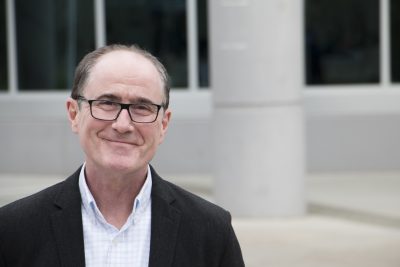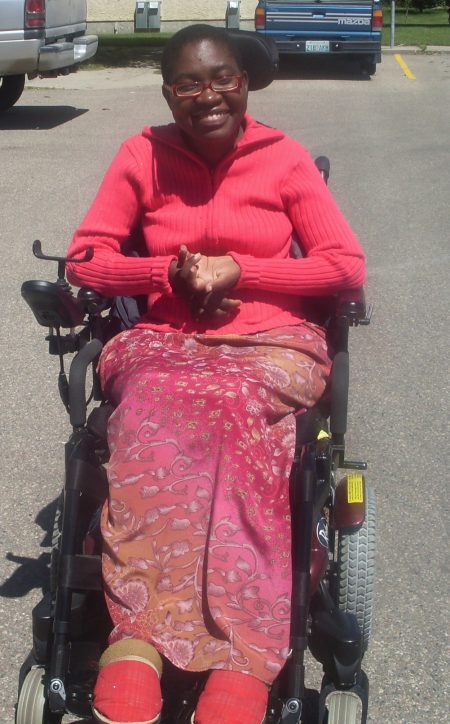In 2004, Selali Tettevi left her home country of Ghana to further her education and start a nursing career in Canada. Four years later, her life changed in an instant when an accident left her with quadriplegia. She could have let her newly acquired disability dissolve her ambition, but that’s not what happened.
“It was tough after being in the accident, but I’ve always been a driven, reach-for-the-skies kind of person,” says Tettevi, now a thesis-based Master of Business Administration (MBA) student at Thompson Rivers University (TRU). “I don’t believe in bending to situations. I believe in bending situations to suit you. So, I figured, do what you do, work around your disability. If the brain is functioning, use it.”
Unable to continue her nursing career, Tettevi began working in health administration and became an advocate for people with disabilities (PWD). Searching for a way to make an even greater impact, in 2021 she enrolled in the MBA program and is now putting her passion for social entrepreneurship together with her commitment to improving the lives of PWD.

Professor Bruce Martin is a co-supervisor of Selali Tettevi’s thesis.
Tettevi is researching ways that social entrepreneurship training is a viable career direction for PWD. Social enterprises are defined as businesses that create positive change. Her program delivers workshops to PWD from Kamloops and Kelowna. Her efforts will not only change the lives of program participants, but also removes barriers and creates a more inclusive society.
“People with disabilities can impact society through such ventures,” Tettevi says. Examples are limited only by the imagination, but one participant brought forward an idea to locally source accessibility products, including wheelchair parts. Currently, parts must be ordered and shipped from afar, meaning people with disabilities must often wait extended periods for critically needed parts and equipment. This business would serve the community while benefiting the environment by reducing pollution caused by long-distance shipping.
“(PWD) get to contribute meaningfully to society and find fulfilment in doing so. It can bring out hidden talents and potential in people who otherwise may think themselves inadequate.”

Selali Tettevi is researching ways to provide social entrepreneurship training to people with disabilities.
Working as a team to create opportunities
While the project is Tettevi’s brainchild, she is not on the journey alone. Dr. Bruce Martin is a professor in TRU’s Department of Human Enterprise and Innovation and is co-supervisor of Tettevi’s thesis, along with faculty member Dr. Tolulope Oluwafemi. Martin has been working in the area of innovation entrepreneurship for marginalized groups for about a decade. He helped Tettevi gather a team of fellow students and recent alumni to design a training program built on research, expertise and empathy. The team is led by a guiding hope that the training will improve the lives of participants by increasing self-efficacy, positively affecting mental health and potentially providing a source of income.
“Quite often PWD, through no fault of their own, have all kinds of barriers to vocational pursuits and so entrepreneurship in general has been seen as one avenue that could help PWD to have vocational success,” says Martin, adding that social entrepreneurship training is another way people with disabilities can generate beneficial business ideas.
Tettevi and her team hosted an introductory session for project candidates in early March and are now taking participants through an eight-week training program. The program involves modules that focus on a variety of topics, such as financing, marketing and structuring a business. At the end of the training, participants pitch their business ideas and receive ongoing mentorship and support through partner organizations.
Financial support propels positive change
Tettevi is providing gift cards to participants in recognition of their time and commitment to the project, funded by a TRU Sustainability Research Grant in 2022.
“I’m grateful we have the funding in place to provide these incentives,” says Tettevi. “It was like a breath of fresh air to get this grant.”
Since starting the MBA program, Tettevi has received the Knowledge First Foundation Bursary and Barbara Guttman Gee Bursary. Grateful for the financial support, Tettevi hopes to pay it forward one day by helping other students attain their goals. In the meantime, the support she’s receiving is helping her conduct quality research that has the potential to affect positive change for both PWD and society as a whole.
“My passion and drive stem from the belief that we are only as good as the limits we place on ourselves,” Tettevi says, adding that following the completion of her MBA, she plans to pursue her doctorate. “I go at my own pace and tell myself not to let my circumstances weigh me down. Everyone struggles. People with disabilities just struggle a little bit more.”
 Green Party deputy jailed
Green Party deputy jailed Report into crash released
Report into crash released Killer on the loose
Killer on the loose PM ups attacks on Poilievre
PM ups attacks on Poilievre CRA will get the money: PM
CRA will get the money: PM PM tight-lipped on TikTok
PM tight-lipped on TikTok Ukraine uses new missiles
Ukraine uses new missiles Biden signs war aid measure
Biden signs war aid measure New US rules for airlines
New US rules for airlines  BoC officials split on rate cut
BoC officials split on rate cut Big loss for Boeing
Big loss for Boeing  Metro sales edged higher
Metro sales edged higher Vees dominating Vipers
Vees dominating Vipers Warriors snakebitten in loss
Warriors snakebitten in loss Iginla off to Europe
Iginla off to Europe Coachella fined $28K
Coachella fined $28K Those are her nipples
Those are her nipples Kanye to launch porn studio
Kanye to launch porn studio




